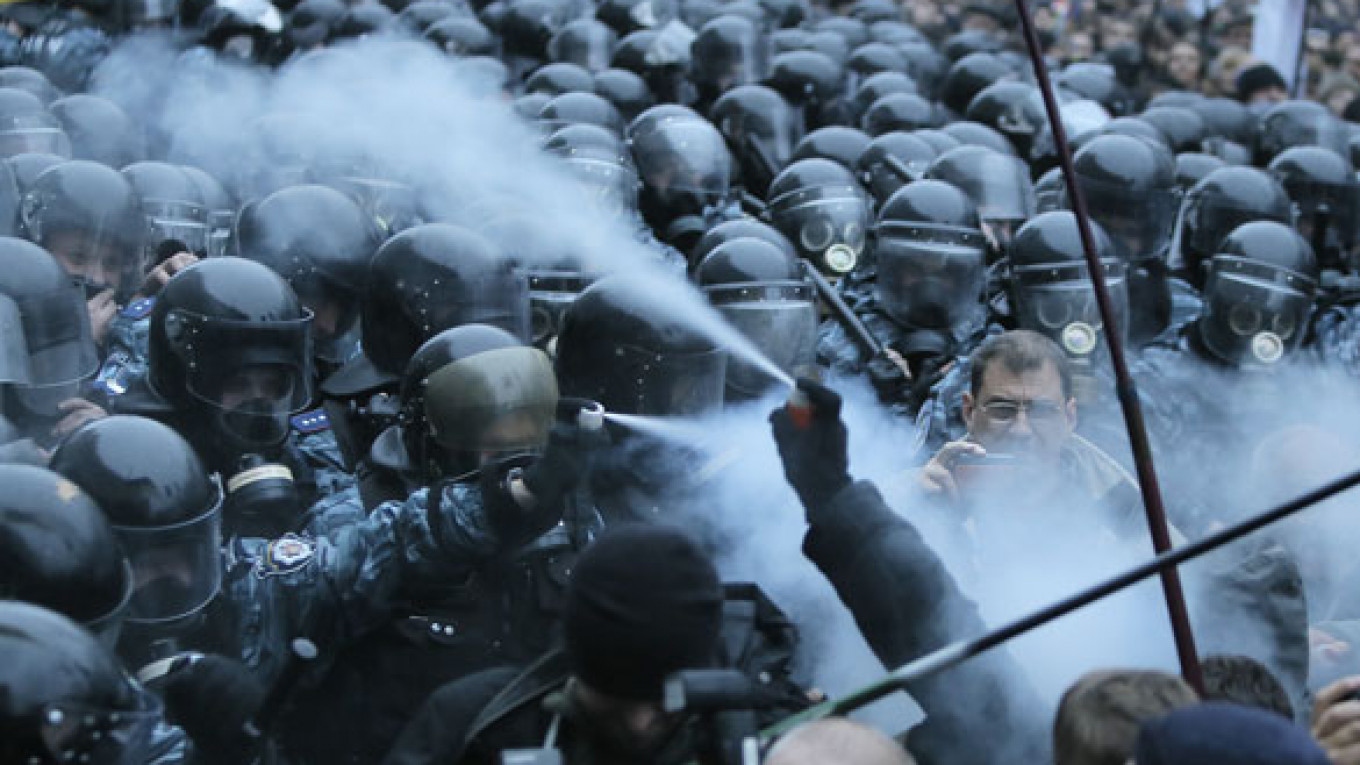Russia and Lithuania traded accusations of blackmail and foul play over the weekend in an apparent tug-of-war over Ukraine, while tens of thousands of people took to the streets in Kiev to demand Ukrainian integration into the European Union.
Protests that erupted in Kiev on Sunday evening were the biggest the country has seen since the 2004 Orange Revolution. The demonstrations — with a turnout of about 50,000, according to The Associated Press — saw clashes between police and protesters, in some cases involving tear gas.
The protests were triggered by the Ukrainian Cabinet's decision on Thursday to abruptly stop preparations for a free trade agreement with the EU in favor of greater cooperation with Russia. The deal with the EU had been expected to be signed at the two-day summit of the Eastern European Partnership to be held in Vilnius on Thursday.
Hours after the Ukrainian government's change of course on Thursday, more than 1,000 protesters gathered at Independence Square in Kiev and opposition deputies declared an indefinite protest until European integration is achieved, Interfax reported.
Speaking at a news conference Friday, President Vladimir Putin responded to news of the protests by accusing the EU of threatening Ukraine with mass protests if it refused to sign a free-trade agreement at the Vilnius summit.
"As for exerting pressure, when we heard the news … that Ukraine is suspending … the signing of an agreement with the EU … this was followed by what essentially amounts to threats from our European partners, even as far as helping to organize mass protests," Putin said in an English-language transcript posted on the Kremlin website.
"Now this is pressure, this is blackmail," Putin said.
He confirmed that Russia would be "forced" to put restrictions on Ukrainian exports to Russia if Ukraine signed a free-trade agreement with the EU, but denied it was blackmail, saying the measure would protect the Russian economy.
Arseniy Yatsenyuk, the leader of Ukraine's Fatherland party, responded by accusing Russia of luring Ukraine out of the planned free-trade agreement with a $20 billion gift.
On Friday, Jovita Neliupsiene, chief adviser to Lithuanian President Dalia Grybauskaite, echoed a similar sentiment, saying Ukrainian President Viktor Yanukovych had rejected the free-trade agreement because of Russia's threat to limit Ukrainian exports to Russia.
"Ukraine has yielded to economic pressure and blackmail," Neliupsiene told the BNS news agency, citing a phone conversation betweeen Grybauskaite and Yanukovych.
According to Neliupsiene, Ukraine believes that the threatened restrictions on exports to Russia from Eastern Ukraine — which represents the bulk of the country's manufacturing industry and employs hundreds of thousands of people — could bring major financial losses to Ukraine.
Ukrainian Prime Minister Mykola Azarov expressed doubt about Neliupsiene's declaration later on Friday, however, saying he believed that the Latvian president's adviser had misinterpreted the telephone conversation with Yanukovych.
"I do not think that was exactly what out president said," Azarov told Ukrainian television, Interfax reported.
Azarov added that Neliupsiene probably had not heard the telephone conversation herself.
Putin, asked to comment on the allegations of both the Latvian president's adviser Neliupsiene and the opposition leader Yatsenyuk, denied the blackmail allegations but did not comment on the allegations of a $20 billion deal.
Russia has a free-trade agreement of its own with Ukraine, which means that European produce would "come flowing" into Russia, too, Putin said, but the country is "not yet competitive enough to match the level of goods produced in the EU market," so the results could be "ruinous."
"This is not a political issue. It is a pragmatic matter, an economic issue," he said.
Sunday's protests in the Ukrainian capital also saw several thousand people rallying in support of the decision to move closer to Moscow.
Between 4,000 to 10,000 supporters of the pro-Russian government of Viktor Yanukovych took to the local Mikhaylovskaya Ploshchad, Interfax reported, citing local police.
Yet, while the pro-government rally proceeded peacefully, the opposition rally resulted in clashes with police after protesters marched to the government building and some tried to break into the building, throwing a smoke bomb at police, Interfax reported. Police used tear gas against one group of the most fervent activists.
Twenty protest tents and 15 army tents were set up in European Square, while a group of opposition activists attempted to erect a number of tents in front of the government building late Sunday, Interfax reported.
German Chancellor Angela Merkel weighed in on the situation over the weekend, saying Saturday that the EU needed to talk to Russia to ensure that the EU's eastern neighbors did not feel pressured to choose between friendship with the West or Moscow, the AP reported.
The pro-Russian parliament of Ukraine's Crimea welcomed the suspension of the EU deal on Friday, Interfax reported.
Contact the author at n.krainova@imedia.ru
A Message from The Moscow Times:
Dear readers,
We are facing unprecedented challenges. Russia's Prosecutor General's Office has designated The Moscow Times as an "undesirable" organization, criminalizing our work and putting our staff at risk of prosecution. This follows our earlier unjust labeling as a "foreign agent."
These actions are direct attempts to silence independent journalism in Russia. The authorities claim our work "discredits the decisions of the Russian leadership." We see things differently: we strive to provide accurate, unbiased reporting on Russia.
We, the journalists of The Moscow Times, refuse to be silenced. But to continue our work, we need your help.
Your support, no matter how small, makes a world of difference. If you can, please support us monthly starting from just $2. It's quick to set up, and every contribution makes a significant impact.
By supporting The Moscow Times, you're defending open, independent journalism in the face of repression. Thank you for standing with us.
Remind me later.






